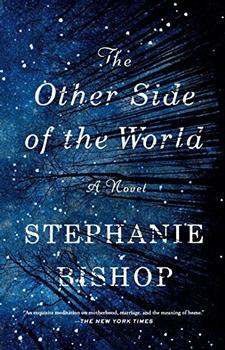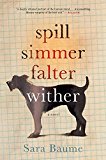Summary | Excerpt | Reviews | Beyond the book | Read-Alikes | Genres & Themes | Author Bio

Some novels rely primarily on the narrator's voice or a realistic historical setting. Others focus on larger-than-life characters or an event-driven plot. But a handful, like Lucy Wood's debut novel, Weathering, are all about atmosphere. The book is set by a river in southwest England; most of it takes place in one falling-down house in the woods. It's a wild place saturated with rain and rotting leaves, and as the dark days of winter draw in, the main characters feel trapped in the dilapidated house that happens to be haunted.
Three generations of women occupy this house: Pearl, an independent, unsentimental older woman who does jewelry repair and birdwatching; her flighty daughter Ada, who is always moving and changing jobs; and Ada's curious, energetic six-year-old daughter, Pepper. The novel cycles between these three characters' perspectives, always in the third person. Before too long, we figure out that Pearl recently died in a household accident. Ada has returned to her childhood home for the first time in thirteen years to scatter her mother's ashes, sort through her belongings, and get the property ready to sell.
In a sense, then, this is a haunted house story. Yet Wood introduces the traces of magical realism so subtly that they never feel jolting. Pearl is simply an ongoing presence in the house and its surroundings. First she's an extra body in the broom closet when Ada shelters there during a game of hide-and-seek; next she's creaking bedsprings and making an imprint on the covers. And then, entirely naturally, she's a third person in the house, carrying on conversations in turn with her daughter and the granddaughter she never met in life.
Like the river, the novel is fluid, moving between the past and present with ease. Pearl remembers the day Ada's father, Frank, left while she was out buying milk. We revisit the last few years of Pearl and Ada's life together in the house, seeing the deterioration of their relationship through the increasing unsuitability of the Christmas presents they buy each other, starting with thoughtful tokens like a photo frame and leather notebook and ending up with canned sardines.
This is not a novel to read purely for the plot, since there is not much to it. While making half-hearted attempts to clear the house and fix it up enough to put on the market, Ada takes a few cooking shifts at the local pub and flirts with Tristan, the handyman who's fixing the roof of the house. Pepper wanders the woods until general disapproval forces Ada to send her to school. On New Year's Day Pepper takes off through the fields and nearly gets lost. With snow-melt plus more rain, the swollen river is threatening a catastrophic flood. Despite it all, Ada is starting to feel at home.
For all its atmosphere, Weathering does begin to meander aimlessly, suggesting it might be better at nearer 200 pages than 300. However, Wood's enchanting prose is full of inventive metaphors: "the trees wearing mist as scarves. The light curdled like old milk" and "threadbare hair and deep rings slung hammocks under his eyes." In the end the most memorable "characters" of all are the house and the river, which take on life and power of their own:
Everything murky and swimming with silt. Leaves came down like raindrops. The wind turned the river into peaks and humps, which jostled [Pearl], which slopped her about; she couldn't keep a hold of anything...Things she loved about the river: its endlessness. Its silvers and rusts. Its babbling that sounded like an old friend. Things she hated about the river: its rushing. Its endless rushing.
And every day the house got worse. Ice inside the windows like bumpy glass. Books curled and smelled like wet towels, doors swelled up and didn't shut properly. … [Pearl] saw the house as she went, standing among shallow water like something marooned. Propped up and grey and bedraggled. An infuriating place. But it was hers.
Wood's previous book, the Somerset Maugham Award-winning (see 'Beyond the Book') short story collection Diving Belles, adapted traditional Cornish folklore. Here, too, there are remnants of ghost and fairy tales, but blended with a realist family story: the three central characters fight feelings of rootlessness by committing to this one flawed place.
With its vivid picture of the English countryside and its clear-eyed look at family dynamics, Weathering reminds me most of recent works by Tessa Hadley, Ross Raisin, and Polly Samson (three authors perhaps less well known in the United States than in their native England). Lucy Wood is an up-and-coming talent whose gently eerie first novel speaks of great things to come.
![]() This review was originally published in The BookBrowse Review in January 2016, and has been updated for the
April 2017 edition.
Click here to go to this issue.
This review was originally published in The BookBrowse Review in January 2016, and has been updated for the
April 2017 edition.
Click here to go to this issue.

If you liked Weathering, try these:

by Stephanie Bishop
Published 2017
In the tradition of The Hours and Revolutionary Road comes a novel set in the 1960s about marriage, motherhood, identity, nostalgia, and the fantasy of home.

by Sara Baume
Published 2017
A debut novel already praised as "unbearably poignant and beautifully told" (Eimear McBride) this captivating story follows - over the course of four seasons - a misfit man who adopts a misfit dog.
Your guide toexceptional books
BookBrowse seeks out and recommends the best in contemporary fiction and nonfiction—books that not only engage and entertain but also deepen our understanding of ourselves and the world around us.